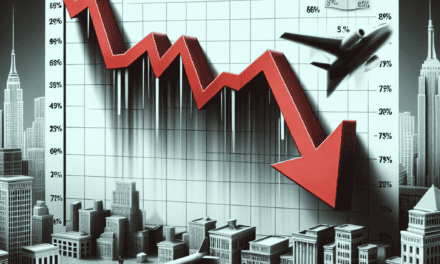“Trump’s De-escalation Plea: A Potential Turning Point for WTI Crude Oil Futures”
Introduction
In recent developments, former President Donald Trump has called for de-escalation in the ongoing conflict in Ukraine, a move that could have significant implications for global energy markets, particularly crude oil West Texas Intermediate (WTI) futures. The geopolitical tensions in Eastern Europe have been a critical factor influencing oil prices, as the region is a major transit route for energy supplies to Europe. Trump’s call for reducing hostilities may lead to a shift in market sentiment, potentially stabilizing or even lowering crude oil prices, which have been volatile due to fears of supply disruptions. This development could impact traders and investors who are closely monitoring the situation for any signs of easing tensions that might affect the supply-demand dynamics in the oil market. As the situation unfolds, the response of the global energy market to these diplomatic efforts will be crucial in determining the future trajectory of WTI futures.
Trump’s Call for De-escalation: Immediate Effects on WTI Crude Oil Prices
In recent developments, former President Donald Trump has made a public call for de-escalation in the ongoing conflict in Ukraine, a move that has captured the attention of global markets, particularly the crude oil sector. The geopolitical tensions between Russia and Ukraine have been a significant factor influencing the volatility of crude oil prices, especially the West Texas Intermediate (WTI) futures. Trump’s statement, therefore, holds considerable weight in the context of international diplomacy and economic stability.
The immediate reaction to Trump’s call for de-escalation was observed in the trading patterns of WTI crude oil futures. Historically, geopolitical tensions in Eastern Europe have led to fluctuations in oil prices due to the region’s critical role in global energy supply chains. Russia, being one of the world’s largest oil producers, plays a pivotal role in the global energy market. Any conflict involving Russia tends to create uncertainty about oil supply, thereby affecting prices. Consequently, Trump’s appeal for peace has been perceived as a potential stabilizing factor, leading to a cautious optimism among traders and investors.
In the hours following Trump’s statement, WTI crude oil futures experienced a slight dip, reflecting a market response that anticipates a possible reduction in geopolitical risk. This reaction underscores the sensitivity of oil prices to political developments and the intricate link between international relations and commodity markets. While the immediate impact on prices was not drastic, it highlighted the market’s responsiveness to any signals that might suggest a shift towards stability in the region.
Moreover, Trump’s call for de-escalation could have broader implications for the energy sector. If successful diplomatic efforts were to follow, leading to a de-escalation of the conflict, it could pave the way for more stable energy markets. This stability would be beneficial not only for oil producers but also for consumers, as it could potentially lead to more predictable pricing and supply conditions. However, it is essential to recognize that the situation remains fluid, and the market’s response is contingent upon tangible developments in the geopolitical landscape.
Furthermore, the impact of Trump’s statement on WTI crude oil futures also reflects the interconnectedness of global markets. Investors and traders are acutely aware that any resolution to the conflict could influence not only oil prices but also broader economic conditions. A de-escalation could lead to improved investor confidence, potentially boosting economic growth prospects in regions heavily reliant on energy imports.
In conclusion, while Trump’s call for de-escalation in Ukraine has had an immediate, albeit modest, impact on WTI crude oil futures, the long-term effects will depend on subsequent diplomatic actions and their success in reducing tensions. The situation serves as a reminder of the intricate relationship between geopolitics and global markets, where political statements can have far-reaching economic consequences. As the world watches closely, the hope is that diplomatic efforts will lead to a peaceful resolution, fostering stability in both the region and the global energy market. The coming weeks will be crucial in determining whether this call for peace translates into tangible outcomes that can sustain the observed market optimism.
Analyzing Market Reactions: WTI Futures Amidst Trump’s Ukraine De-escalation Appeal
In recent developments, former President Donald Trump has made a public appeal for de-escalation in the ongoing conflict in Ukraine. This call for peace has reverberated across various sectors, notably impacting the financial markets, including crude oil West Texas Intermediate (WTI) futures. As geopolitical tensions often play a significant role in influencing oil prices, Trump’s statement has prompted market participants to reassess their positions and expectations.
The conflict in Ukraine has been a critical factor in the volatility of global oil prices. The region’s strategic importance as a transit route for energy supplies to Europe means that any instability can lead to disruptions in supply chains, thereby affecting oil prices. Consequently, Trump’s call for de-escalation has been perceived as a potential stabilizing factor, which could alleviate some of the supply concerns that have been driving prices upward.
In the immediate aftermath of Trump’s statement, there was a noticeable reaction in the WTI futures market. Traders, who had been pricing in a risk premium due to the ongoing conflict, began to adjust their strategies. The prospect of reduced tensions suggested a lower likelihood of supply disruptions, which in turn could lead to a moderation in prices. This shift in sentiment was reflected in the trading patterns, with some investors opting to reduce their long positions in anticipation of a potential decrease in prices.
Moreover, the broader implications of a de-escalation in Ukraine extend beyond immediate supply concerns. A reduction in geopolitical tensions could lead to a more stable economic environment, encouraging investment and growth. This potential for increased economic activity could, paradoxically, lead to higher demand for oil in the long term, as industries ramp up production and transportation needs increase. Thus, while the short-term impact on WTI futures might be a decrease in prices, the long-term effects could be more complex, with potential upward pressure on prices as demand dynamics shift.
It is also important to consider the role of other market factors that could influence WTI futures. While geopolitical developments are significant, they are not the sole determinants of oil prices. Factors such as OPEC’s production decisions, changes in global demand patterns, and technological advancements in energy production all play crucial roles. Therefore, while Trump’s call for de-escalation is a noteworthy development, it is one of many variables that market participants must consider.
Furthermore, the response of other key stakeholders, such as the European Union and Russia, will be critical in determining the actual impact of any de-escalation efforts. If these parties respond positively to Trump’s appeal, it could lead to a more sustained period of stability, further influencing market dynamics. Conversely, if tensions persist despite the call for peace, the initial market reactions may prove to be premature.
In conclusion, Trump’s call for de-escalation in Ukraine has introduced a new dimension to the analysis of WTI futures. While the immediate market reaction suggests a potential easing of supply concerns, the long-term implications remain uncertain. As the situation continues to evolve, market participants will need to remain vigilant, considering a multitude of factors that could influence the trajectory of crude oil prices. The interplay between geopolitical developments and market fundamentals will continue to shape the landscape of WTI futures in the coming months.
Geopolitical Tensions and Energy Markets: Trump’s Influence on WTI Crude Oil
In recent developments, former President Donald Trump has called for a de-escalation of tensions in Ukraine, a move that has captured the attention of global markets, particularly the energy sector. The geopolitical landscape has been fraught with uncertainty, and Trump’s intervention adds a new dimension to the ongoing crisis. His call for peace comes at a time when the world is closely monitoring the situation in Eastern Europe, as any escalation could have significant ramifications for global energy supplies and prices. The impact of such geopolitical tensions on energy markets, especially on West Texas Intermediate (WTI) crude oil futures, is a subject of considerable interest and concern.
The energy markets are highly sensitive to geopolitical events, and the situation in Ukraine is no exception. The region is a critical transit route for energy supplies to Europe, and any disruption could lead to significant volatility in oil prices. Trump’s call for de-escalation, therefore, has the potential to influence market sentiment and, consequently, the pricing of WTI crude oil futures. Historically, geopolitical tensions have led to increased volatility in oil markets, as traders and investors react to the potential for supply disruptions. In this context, Trump’s intervention could be seen as a stabilizing factor, potentially easing fears of an imminent crisis and calming the markets.
However, the influence of Trump’s call for peace should not be overstated. While his statements may have a short-term impact on market sentiment, the underlying geopolitical dynamics remain complex and multifaceted. The situation in Ukraine involves numerous stakeholders, each with their own interests and agendas. As such, the resolution of tensions is unlikely to be straightforward or swift. Nevertheless, Trump’s involvement underscores the interconnectedness of global politics and energy markets, highlighting how political figures can sway market perceptions and expectations.
Moreover, the response of the energy markets to Trump’s call for de-escalation will depend on a variety of factors, including the actions of other key players in the region and the broader geopolitical context. For instance, any moves by Russia or NATO in response to Trump’s statements could either reinforce or undermine his call for peace, thereby influencing market reactions. Additionally, the global economic outlook, including factors such as demand for oil and the pace of economic recovery from the COVID-19 pandemic, will also play a crucial role in determining the trajectory of WTI crude oil futures.
In conclusion, while Trump’s call for de-escalation in Ukraine has the potential to impact WTI crude oil futures, it is essential to consider the broader geopolitical and economic context. The energy markets are inherently complex and influenced by a myriad of factors, both political and economic. As such, while Trump’s intervention may offer a momentary respite from market volatility, the long-term outlook for WTI crude oil futures will depend on the resolution of underlying geopolitical tensions and the interplay of global economic forces. As the situation continues to evolve, market participants will need to remain vigilant, closely monitoring developments in Ukraine and beyond to navigate the uncertainties of the energy markets effectively.
Trump’s Ukraine Strategy: Long-term Implications for Crude Oil WTI Futures
In recent developments, former President Donald Trump has called for a de-escalation of tensions in Ukraine, a move that has significant implications for global markets, particularly the crude oil West Texas Intermediate (WTI) futures. As geopolitical tensions have historically influenced oil prices, Trump’s stance introduces a new dynamic into the already complex interplay of factors affecting the energy sector. Understanding the potential long-term implications of this call for de-escalation requires a closer examination of the interconnectedness between geopolitical stability and energy markets.
To begin with, the situation in Ukraine has been a focal point of international concern, with its potential to disrupt energy supplies and influence global oil prices. The region’s strategic importance as a transit route for energy supplies to Europe cannot be overstated. Consequently, any escalation in conflict poses a risk to the stability of energy markets, leading to increased volatility in crude oil prices. Trump’s call for de-escalation, therefore, could be seen as a stabilizing factor, potentially easing market anxieties and contributing to a more predictable pricing environment for WTI futures.
Moreover, the impact of geopolitical tensions on crude oil prices is often reflected in the risk premium that traders incorporate into their pricing models. When tensions rise, the perceived risk of supply disruptions increases, leading to higher prices. Conversely, a de-escalation could reduce this risk premium, potentially leading to a moderation in prices. Trump’s intervention, if successful in fostering a more peaceful resolution, might thus contribute to a recalibration of market expectations, influencing the long-term trajectory of WTI futures.
Furthermore, it is essential to consider the broader context of global energy demand and supply dynamics. The call for de-escalation comes at a time when the world is grappling with the transition to cleaner energy sources, while still heavily reliant on fossil fuels. Any reduction in geopolitical tensions could provide a more stable backdrop for this transition, allowing for more strategic planning and investment in energy infrastructure. This stability could, in turn, influence the long-term supply-demand balance, impacting WTI futures as market participants adjust their strategies in response to a potentially less volatile geopolitical landscape.
In addition, the role of major oil-producing nations and their responses to geopolitical developments cannot be overlooked. Countries such as Russia and members of the Organization of the Petroleum Exporting Countries (OPEC) play a crucial role in determining global oil supply. A de-escalation in Ukraine might lead to shifts in their production strategies, as they respond to changes in market conditions and geopolitical alliances. These shifts could have lasting effects on the supply side of the equation, further influencing the long-term outlook for WTI futures.
In conclusion, Trump’s call for de-escalation in Ukraine introduces a significant variable into the complex equation of global energy markets. While the immediate impact on crude oil WTI futures may be subject to various factors, the potential for reduced geopolitical tensions offers a pathway to greater market stability. As the world continues to navigate the challenges of energy transition and geopolitical uncertainty, the long-term implications of such diplomatic efforts could play a pivotal role in shaping the future of crude oil markets. Market participants and policymakers alike will need to closely monitor these developments, as they hold the potential to redefine the landscape of global energy trade.
Investor Sentiment and WTI Futures: The Trump Factor in Ukraine
In recent developments, former President Donald Trump has called for de-escalation in the ongoing conflict in Ukraine, a move that has captured the attention of investors and market analysts alike. This call for peace comes at a time when geopolitical tensions have been a significant driver of market volatility, particularly in the energy sector. The conflict in Ukraine has had far-reaching implications, not only for the region but also for global markets, with crude oil prices being particularly sensitive to the unfolding events. As such, Trump’s statements have sparked discussions about their potential impact on investor sentiment and, consequently, on West Texas Intermediate (WTI) crude oil futures.
The relationship between geopolitical tensions and crude oil prices is well-documented. Historically, conflicts involving major oil-producing regions or countries have led to supply concerns, which in turn drive up oil prices. The situation in Ukraine is no exception, as the country is a key transit route for Russian natural gas exports to Europe. Any disruption in this supply chain can have significant repercussions on global energy markets. Therefore, Trump’s call for de-escalation is seen by some as a potential stabilizing factor that could alleviate some of the supply concerns currently weighing on the market.
Investor sentiment plays a crucial role in the movement of WTI futures, as traders and investors often react swiftly to geopolitical developments. The mere possibility of reduced tensions in Ukraine could lead to a shift in market sentiment, prompting investors to reassess their positions in the energy sector. If Trump’s call for peace is perceived as credible and likely to lead to tangible results, it could result in a decrease in the risk premium that has been factored into oil prices. This, in turn, might lead to a softening of WTI futures, as the market adjusts to a potentially less volatile geopolitical landscape.
However, it is important to consider that the impact of Trump’s statements on WTI futures is not solely dependent on the words themselves but also on the broader geopolitical context and the actions of other key players involved in the conflict. While Trump’s influence on global politics remains significant, the resolution of the Ukraine conflict involves multiple stakeholders, including Russia, Ukraine, and various international organizations. Therefore, any potential de-escalation would require coordinated efforts and negotiations beyond Trump’s call for peace.
Moreover, market participants are likely to remain cautious, as geopolitical situations are inherently unpredictable. While a call for de-escalation is a positive step, it does not guarantee an immediate resolution to the conflict. Investors may adopt a wait-and-see approach, closely monitoring developments on the ground and the responses of other influential figures and nations. This cautious stance could temper any immediate impact on WTI futures, as traders weigh the potential for lasting peace against the possibility of continued instability.
In conclusion, Trump’s call for de-escalation in Ukraine has introduced a new variable into the complex equation of investor sentiment and WTI futures. While the potential for reduced tensions could lead to a reassessment of risk premiums in the oil market, the ultimate impact will depend on a range of factors, including the actions of other geopolitical actors and the evolving situation in Ukraine. As such, investors and market analysts will continue to keep a close eye on developments, ready to adjust their strategies in response to the ever-changing geopolitical landscape.
Comparative Analysis: WTI Crude Oil Futures Before and After Trump’s De-escalation Call
In recent developments, former President Donald Trump has made a public call for de-escalation in the ongoing conflict in Ukraine, a move that has sparked significant interest and speculation in global markets, particularly in the energy sector. The geopolitical tensions between Russia and Ukraine have been a major factor influencing crude oil prices, especially the West Texas Intermediate (WTI) futures. As the conflict has persisted, it has contributed to volatility in oil markets, with prices often reacting sharply to news of escalations or potential resolutions. Trump’s call for de-escalation, therefore, presents an opportunity to examine the comparative impact on WTI crude oil futures before and after his statement.
Prior to Trump’s intervention, the WTI crude oil futures market was characterized by heightened volatility. The uncertainty surrounding the conflict, coupled with concerns over potential disruptions in oil supply from the region, had led to fluctuating prices. Market participants were particularly wary of any developments that could exacerbate the situation, such as increased military activity or further sanctions on Russia, which is a major global oil producer. Consequently, traders and investors closely monitored geopolitical news, with prices often spiking in response to negative developments.
In this context, Trump’s call for de-escalation introduced a new dynamic into the market. His statement, advocating for a reduction in hostilities and a diplomatic resolution to the conflict, was perceived by some as a potential catalyst for easing tensions. This perception was reflected in the immediate reaction of the WTI crude oil futures market, where prices showed signs of stabilization. The prospect of a de-escalation raised hopes that the risk of supply disruptions could diminish, thereby alleviating some of the upward pressure on prices.
However, it is important to note that the impact of Trump’s call was not uniform across the market. While some investors viewed it as a positive development, others remained skeptical about its potential effectiveness. The complex nature of the conflict, involving multiple stakeholders with differing interests, meant that a single call for de-escalation, even from a prominent figure like Trump, was unlikely to result in an immediate resolution. As a result, while there was a temporary calming effect on prices, the underlying uncertainty persisted, leading to continued caution among market participants.
Moreover, the broader context of global oil supply and demand dynamics also played a crucial role in shaping the market’s response. Factors such as OPEC’s production decisions, the pace of economic recovery post-pandemic, and shifts in energy policy in major economies continued to influence WTI crude oil futures. These elements, combined with the geopolitical situation, created a complex web of factors that traders had to navigate.
In conclusion, Trump’s call for de-escalation in Ukraine had a noticeable, albeit nuanced, impact on WTI crude oil futures. While it introduced a momentary sense of optimism and contributed to a stabilization of prices, the market’s response was tempered by ongoing uncertainties and broader economic considerations. As the situation in Ukraine evolves, the interplay between geopolitical developments and market dynamics will remain a key area of focus for investors and analysts alike, underscoring the intricate relationship between global politics and energy markets.
Global Energy Markets: How Trump’s Ukraine Stance Affects WTI Crude Oil
In recent developments, former President Donald Trump has called for a de-escalation of tensions in Ukraine, a move that has significant implications for global energy markets, particularly the West Texas Intermediate (WTI) crude oil futures. As geopolitical tensions often play a crucial role in influencing oil prices, Trump’s stance could potentially lead to shifts in market dynamics. The situation in Ukraine has been a focal point of international concern, with the conflict causing disruptions in energy supplies and contributing to volatility in oil prices. Trump’s call for de-escalation comes at a time when the global energy market is already grappling with uncertainties stemming from supply chain disruptions and fluctuating demand patterns.
The impact of geopolitical tensions on crude oil prices is well-documented, as conflicts in key regions can lead to supply constraints and heightened market anxiety. In the case of Ukraine, the ongoing conflict has raised concerns about the stability of energy supplies from Eastern Europe, a region that plays a pivotal role in the global energy landscape. As a result, any potential resolution or de-escalation of tensions could alleviate some of the pressure on oil prices, providing a sense of stability to the market. Trump’s intervention, therefore, is seen as a potential catalyst for change, with market participants closely monitoring the situation for any signs of progress.
Moreover, the relationship between geopolitical events and oil prices is often mediated by market sentiment, which can be influenced by political statements and actions. Trump’s call for de-escalation may signal to investors and traders that there is a possibility of reduced conflict, which could, in turn, lead to a decrease in the risk premium associated with oil prices. This potential shift in sentiment could have a stabilizing effect on WTI crude oil futures, as market participants adjust their expectations in response to evolving geopolitical dynamics.
Furthermore, the global energy market is currently navigating a complex landscape characterized by the transition to renewable energy sources and the ongoing recovery from the COVID-19 pandemic. In this context, any developments that contribute to stability in traditional energy markets are likely to be welcomed by stakeholders. A de-escalation in Ukraine could provide a much-needed respite for the oil market, allowing for a more balanced approach to addressing both short-term supply concerns and long-term sustainability goals.
In addition to the immediate impact on oil prices, Trump’s call for de-escalation may also have broader implications for international relations and energy diplomacy. By advocating for a reduction in tensions, there is potential for increased dialogue and cooperation among key stakeholders, which could pave the way for more collaborative approaches to addressing global energy challenges. This, in turn, could foster a more stable and predictable environment for energy markets, benefiting both producers and consumers.
In conclusion, Trump’s call for de-escalation in Ukraine has the potential to influence WTI crude oil futures by alleviating some of the geopolitical pressures that have contributed to market volatility. As the situation unfolds, market participants will be closely watching for any signs of progress, with the hope that a reduction in tensions could lead to greater stability in the global energy market. While the long-term implications remain uncertain, the prospect of de-escalation offers a glimmer of hope for a more balanced and resilient energy landscape.
Q&A
1. **What was Trump’s main message regarding the Ukraine conflict?**
– Trump called for de-escalation in the Ukraine conflict, urging diplomatic efforts to reduce tensions.
2. **How did Trump’s call for de-escalation impact market sentiment?**
– The call for de-escalation was seen as a potential easing of geopolitical tensions, which can lead to a more stable market environment.
3. **What immediate effect did Trump’s statement have on crude oil WTI futures?**
– The statement led to a decrease in crude oil WTI futures prices as the market anticipated a potential reduction in supply disruptions.
4. **Why do geopolitical tensions in Ukraine affect crude oil prices?**
– Ukraine is a key transit route for Russian oil and gas exports to Europe, and conflicts can threaten supply chains, leading to increased oil prices.
5. **What are WTI futures, and why are they significant?**
– WTI (West Texas Intermediate) futures are contracts for the delivery of crude oil, serving as a benchmark for oil prices in the U.S. and globally.
6. **How do changes in crude oil prices impact the global economy?**
– Fluctuations in crude oil prices can affect inflation, consumer spending, and economic growth, influencing global economic stability.
7. **What other factors could influence crude oil WTI futures aside from geopolitical tensions?**
– Factors include OPEC production decisions, U.S. shale production levels, global demand trends, and changes in energy policies.
Conclusion
Donald Trump’s call for de-escalation in Ukraine could potentially lead to a decrease in geopolitical tensions, which often have a significant impact on global oil markets. If tensions ease, the risk premium associated with crude oil prices might diminish, leading to a potential decrease in West Texas Intermediate (WTI) futures prices. This could result in increased market stability and potentially lower energy costs. However, the actual impact would depend on the broader geopolitical context and market reactions to any de-escalation efforts.





